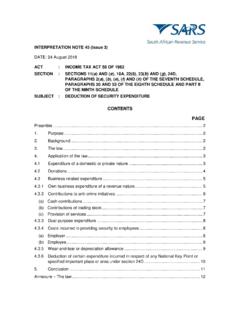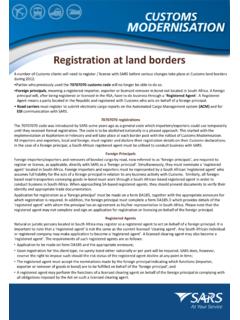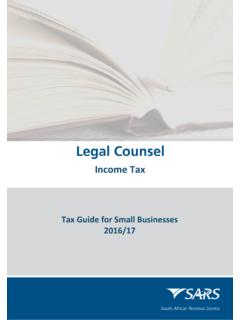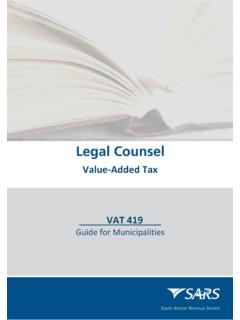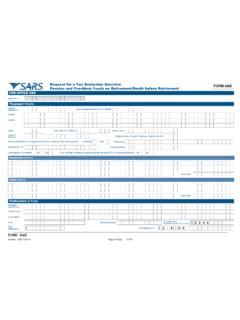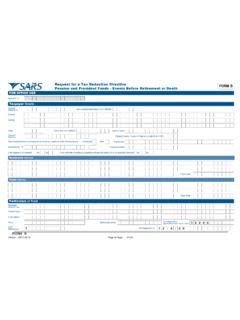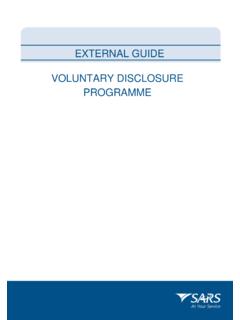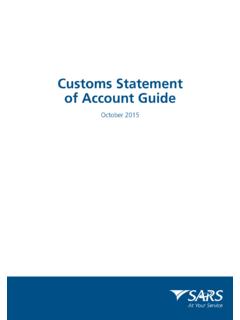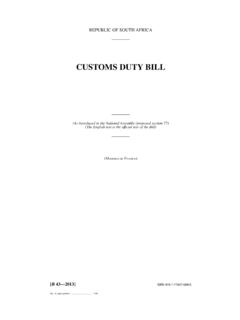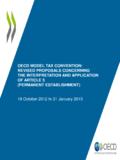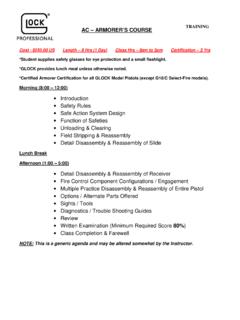Transcription of INTERPRETATION NOTE 9 (Issue 7) ACT - SARS Home
1 INTERPRETATION NOTE: NO. 9 (Issue 6) DATE: 26 July 2016 ACT : INCOME TAX ACT NO. 58 OF 1962 SECTION : SECTION 12E SUBJECT : small business CORPORATIONS CONTENTS PAGE Preamble .. 2 1. Purpose .. 3 2. Background .. 3 3. The law .. 4 4. Application of the law .. 4 Qualifying requirements .. 4 Legal entity requirement [section 12E(4)(a)] .. 4 (a) Close corporation .. 4 (b) Co-operatives .. 5 (c) Private company .. 5 Holder of shares requirement .. 6 (a) The holding of shares in the potential small business corporation [section 12E(4)(a)] .. 6 (b) The holding of shares in any other company by the holders of shares or members of the close corporation or co-operative [section 12E(4)(a)(ii)] .. 7 Gross income limitation requirement [section 12E(4)(a)(i)] .. 8 (a) Gross income .. 8 (b) Year of assessment .. 9 (c) Variation of the gross income limitation .. 9 business activity requirement [section 12E(4)(a)(iii) and (iv)] .. 10 (a) Definition of investment income [section 12E(4)(c)].
2 11 (b) Definition of personal service [section 12E(4)(d)] .. 12 (c) Calculation of the 20% limitation on investment income and income from rendering a personal service [section 12E(4)(a)(iii)] .. 16 Prohibition of personal service providers [section 12E(4)(a)(iv)] .. 21 small business corporation assets [section 12E(1) and (1A)] .. 21 Plant or machinery used directly in a process of manufacture or a process of a similar nature [section 12E(1)] .. 22 (a) Plant and machinery .. 22 2 (b) Process of manufacture or similar process .. 23 (c) Owned by and brought into use by the small business corporation .. 24 (d) Meaning of used directly in a process of manufacture or similar process .. 25 (e) Other deductions and allowances .. 27 Other assets [section 12E(1A)] .. 27 (a) Qualifying assets .. 28 (b) Meaning of in respect of which a deduction is allowable under section 11(e) .. 30 (c) Acquisition by a small business corporation .. 31 (d) Election of the small business corporation in the year the asset is brought into use.
3 31 (e) Amount of the allowance under section 12E(1A)(b) .. 32 Cost of an asset [section 12E(2)] .. 35 (a) Determination of cost for replacement assets .. 35 Limitation on the amount of the allowance available under section 12E(1) and 12E(1A) .. 36 Cost in moving an asset [section 12E(3)] .. 38 Assets acquired for no consideration .. 40 5. Recoupment and roll-over relief upon disposal .. 41 6. Loss on disposal of depreciable assets [section 11(o)] .. 43 7. Impact of a fluctuating small business corporation status on the accelerated allowance .. 44 Tax treatment of capital allowances claimed under other provisions of the Act before qualifying as a small business corporation .. 44 Loss of SBC status before deducting the full cost of an asset under section 12E(1A) .. 44 8. Objection and appeal .. 44 9. Conclusion .. 44 Annexure A The law .. 46 Annexure B Permissible holding of shares or interests .. 50 Preamble In this Note unless the context indicates otherwise Close Corporations Act means the Close Corporations Act No.
4 69 of 1984; Companies Act means the Companies Act No. 71 of 2008; Co-operatives Act means the Co-operatives Act No. 14 of 2005; qualifying entity means a close corporation , a co-operative and any private company as defined in section 1 of the Companies Act (see ); SBC means small business corporation; Schedule means a Schedule to the Act; section means a section of the Act; 3 TA Act means the Tax Administration Act No. 28 of 2011; the Act means the Income Tax Act No. 58 of 1962; VAT Act means the Value-Added Tax Act No. 89 of 1991; and any other word or expression bears the meaning ascribed to it in the Act. All guides, INTERPRETATION notes and practice notes referred to in this Note are available on the SARS website at 1. Purpose This Note provides guidance on the INTERPRETATION and application of section 12E which provides accelerated depreciation allowances for a taxpayer that qualifies as an SBC.
5 This Note does not address other sections in the Act which contain provisions that refer to or are applicable to a small business corporation as defined in section 12E. For example, section 8FA(3)(a) provides that section 8FA, which deems hybrid interest to be a dividend in specie, does not apply to a debt owed by an SBC. Section 8FA is not discussed in this Note. Section 10(1)(zK) and section 23O apply when an amount of funding has been received by or accrued to an SBC from a small business funding entity as defined in section 1(1). Generally, these sections provide for the exemption of such receipts and accruals and the reduction of the deduction available for related expenditure. In this regard, this Note considers only the impact of such receipts and accruals on the allowances available under section 12E(1) and (1A). Some of the requirements in section 12E refer to the Companies Act.
6 This Note discusses those requirements with reference to that Act but does not discuss the requirements, which may have been different in some respects, when the Act previously referred to the Companies Act No. 61 of 1973. 2. Background Section 12E sets out the requirements which must be met in order for a specified entity to qualify as an SBC. It provides accelerated depreciation allowances on certain capital assets brought into use by an SBC. In addition, section 5(2) and the annual Rates and Monetary Amounts and Amendment of Revenue Laws Acts provide for concessionary tax rates which follow a graduated marginal structure (0%, 7%, 21% and 28%)1 as opposed to a flat corporate rate of 28%. The ITR14 return contains a question asking taxpayers whether they are an SBC as referred to in section 12E. The question must be answered yes if a taxpayer meets the requirements of an SBC as stipulated in section 12E.
7 If the question is answered yes , a further set of questions relating to section 12E will be asked within the return. The answers to these additional questions will determine whether the taxpayer will be assessed as an SBC for that year of assessment. 1 See the Guide for Tax Rates/Duties/Levies (Issue 12) dated 29 March 2016, for the rates and marginal structure applicable to different years of assessment. 4 3. The law The relevant provisions are quoted in Annexure A. 4. Application of the law Qualifying requirements In order to qualify as an SBC, an entity must meet the requirements stipulated in the definition of small business corporation in section 12E(4)(a). These requirements comprise four key areas, namely: A legal entity requirement (see ) A holder of shares requirement (see ) A gross income limitation requirement (see ) A business activity requirement (see ) In addition, the entity may not be a personal service provider as defined in the Fourth Schedule.
8 The prohibition relating to personal service providers is discussed in The requirements must be reconsidered every year of assessment since an entity could meet all the requirements and be an SBC in one year of assessment but not in another year of assessment. Legal entity requirement [section 12E(4)(a)] One of the requirements in qualifying as an SBC is that the taxpayer must be a juristic person in the form of a close corporation , co-operative or private company as defined in section 1 of the Companies Act. In this Note these entities, which are included in the definition of company in section 1(1), are referred to as qualifying entities . (a) Close corporation A close corporation is defined in section 1(1) as a close corporation within the meaning of the Close Corporations Act. The Close Corporations Act defines a corporation as a close corporation referred to in section 2(1) which has been registered under that Act.
9 A close corporation is therefore a juristic person, with between one and ten2 persons who qualified for membership, which has complied with that Act s requirements for the registration of its founding statement and has duly registered under that Act. A person or group of persons is prohibited from registering a close corporation as from 1 May 2011. However close corporations incorporated and registered before this date may still qualify as an SBC if the other requirements of section 12E(4)(a) are met. 2 Section 28 of the Close Corporations Act. 5 (b) Co-operatives A co-operative is defined in section 1(1) as any association of persons registered under section 27 of the Co-operatives Act No. 91 of 19813 or section 7 of the Co-operatives Act. The Co-operatives Act and Regulations4 provide a regulatory framework for co-operatives by setting out the requirements and procedures for the functioning and operations of the various types of co-operatives.
10 While it is accepted that a large number of co-operatives may operate informally and, as such, may not be formally registered, only entities that are duly registered under the Acts referred to above may qualify as SBCs. (c) Private company A private company is defined in section 1 of the Companies Act as a profit company that (a) is not a public,5 personal liability,6 or state-owned company;7 and (b) satisfies the criteria set out in section 8(2)(b); . Under the Companies Act No. 61 of 1973 a personal liability company was a private company which was not specifically defined or excluded from being a private company. As a result it could historically have qualified as an SBC. This situation, however, no longer prevails since a personal liability company is specifically excluded from the definition of private company .8 A company is in turn defined in section 1 of the Companies Act as a juristic person which is incorporated under the Companies Act, is a domesticated company or immediately before 1 May 2011 was registered under the Companies Act No.
